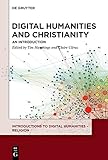Introductions to Digital Humanities – Religion. Volume 4, Digital Humanities and Christianity ; An Introduction / ed. by Tim Hutchings, Claire Clivaz.
Material type: TextSeries: Introductions to Digital Humanities – Religion ; Volume 4Publisher: Berlin ; Boston : De Gruyter, [2021]Copyright date: ©2021Description: 1 online resource (VI, 343 p.)Content type:
TextSeries: Introductions to Digital Humanities – Religion ; Volume 4Publisher: Berlin ; Boston : De Gruyter, [2021]Copyright date: ©2021Description: 1 online resource (VI, 343 p.)Content type: - 9783110559897
- 9783110571882
- 9783110574043
- 230.00285 23
- BR115.C65 D55 2021eb
- online - DeGruyter
- Issued also in print.
| Item type | Current library | Call number | URL | Status | Notes | Barcode | |
|---|---|---|---|---|---|---|---|
 eBook
eBook
|
Biblioteca "Angelicum" Pont. Univ. S.Tommaso d'Aquino Nuvola online | online - DeGruyter (Browse shelf(Opens below)) | Online access | Not for loan (Accesso limitato) | Accesso per gli utenti autorizzati / Access for authorized users | (dgr)9783110574043 |
Frontmatter -- Table of Contents -- Introduction -- Part I: Canon, corpus and manuscript -- The Bible in the digital age: multimodal Scriptures in communities -- Re-conceiving the Christian scholastic corpus with the scholastic commentaries and texts archive -- Canonical structure and the referencing of digital resources for the study of ancient and medieval Christianity -- Digitizing the ancient versions of the Apostolic Fathers: preliminary considerations -- Part II: Words and meanings -- Languages, texts, and inscribed objects of early Christianity: a survey of digital resources for students -- Between statistics and hermeneutics: the interplay between digital and traditional methods in Hebrew linguistics as evidenced from the study of hapax legomena -- Lexicography, the Louw–Nida Lexicon, and computational co-occurrence analysis -- Part III: Digital Christian history -- From inquisition to inquiry: inquisitorial records as a source for social network analysis -- Visualizing religious networks, movements, and communities: building Moravian Lives -- The theology of relational practice: digital modeling and the historical study of Christianity -- Liturgical history in a digital world: principles and future developments -- Part IV: Theology and pedagogy -- Digital pedagogy and spiritual formation: training for ministry and games for children -- Nested histories: digital humanities as pedagogical laboratory for early Christian studies -- Public theology behind the Great Firewall of China -- Index
restricted access online access with authorization star
http://purl.org/coar/access_right/c_16ec
This volume provides the first comprehensive introduction to the intersections between Christianity and the digital humanities. DH is a well-established, fast-growing, multidisciplinary field producing computational applications and analytical models to enable new kinds of research. Scholars of Christianity were among the first pioneers to explore these possibilities, using digital approaches to transform the study of Christian texts, history and ideas, and innovative work is taking place today all over the world. This volume aims to celebrate and continue that legacy by bringing together 15 of the most exciting contemporary projects, grouped into four categories. “Canon, corpus and manuscript” examines physical texts and collections. “Words and meanings” explores digital approaches to language and linguistics. “Digital history” uses digital techniques to explore the Christian past, and “Theology and pedagogy” engages with digital approaches to teaching, formation and Christian ideas. This volume introduces key debates, shares exciting initiatives, and aims to encourage new innovations in analysis and communication. Christianity and the Digital Humanities is ideally suited as a starting point for students and researchers interested in this vast and complex field.
Issued also in print.
Mode of access: Internet via World Wide Web.
In English.
Description based on online resource; title from PDF title page (publisher's Web site, viewed 01. Dez 2022)


